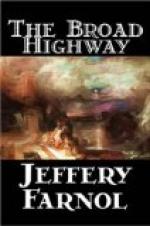“By all means,” said he, “though Sir Jasper would hardly seem in a drinking humor,” and, with the very slightest shrug of the shoulders, he turned back to the mirror again.
“No, Mr. Chester, I am not—in a drinking humor,” answered Sir Jasper, without turning round, or taking his eyes from the window.
“Sir Jasper?” said I to myself, “now where, and in what connection, have I heard such a name before?”
He was of a slight build, and seemingly younger than either of his companions by some years, but what struck me particularly about him was the extreme pallor of his face. I noticed also a peculiar habit he had of moistening his lips at frequent intervals with the tip of his tongue, and there was, besides, something in the way he stared at the trees, the wet road, and the gray sky—a strange wide-eyed intensity—that drew and held my attention.
“Devilish weather—devilish, on my life and soul!” exclaimed the short, red-faced man, in a loud, peevish tone, tugging viciously at the bell-rope, “hot one day, cold the next, now sun, now rain— Oh, damn it! Now in France—ah, what a climate—heavenly —positively divine; say what you will of a Frenchman, damn him by all means, but the climate, the country, and the women—who would not worship ’em?”
“Exactly!” said the languid gentleman, examining a pimple upon his chin with a high degree of interest, “always ’dored a Frenchwoman myself; they’re so—so ah—so deuced French, though mark you, Selby,” he broke off, as the rosy-cheeked maid appeared with the brandy and glasses,” though mark you, there’s much to be said for your English country wenches, after all,” saying which, he slipped his arm about the girl’s round waist. There was the sound of a kiss, a muffled shriek, and she had run from the room, slamming the door behind her, whereupon the languid gentleman went back to his pimple.
“Oh! as to that, Chester, I quarrel only with the climate. God made England, and the devil sends the weather!”
“Selby,” said Sir Jasper, in the same repressed tone that he had used before and still without taking his eyes from the gray prospect of sky and tree and winding road, “there is no fairer land, in all the world, than this England of ours; it were a good thing to die—for England, but that is a happiness reserved for comparatively few.” And, with the words, he sighed, a strange, fluttering sigh, and thrust his hands deeper into his pockets.
“Die!” repeated the man Selby, in a loud, boisterous way. “Who talks of death?”
“Deuced unpleasant subject!” said the other, with a shrug at the cracked mirror. “Something so infernally cold and clammy about it—like the weather.”
“And yet it will be a glorious day later. The clouds are thinning already,” Sir Jasper went on; “strange, but I never realized, until this morning, how green—and wonderful—everything is!”
The languid Mr. Chester forgot the mirror, and turned to stare at Sir Jasper’s back, with raised brows, while the man Selby shook his head, and smiled unpleasantly. As he did so, his eye encountered me, where I sat, quietly in my corner, smoking my negro-head pipe, and his thick brows twitched sharply together in a frown.




